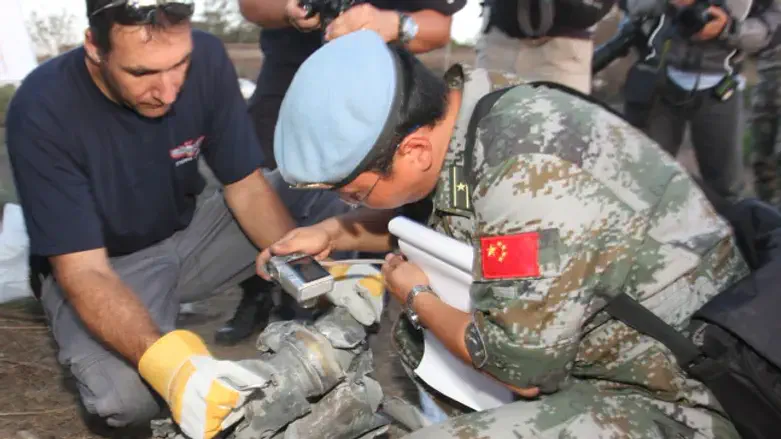by Israel National News
As Israel's Operation Northern Arrows continues, Israeli forces have come into conflict with UNIFIL steadily more frequently. What is its role in the conflict between Israel and its northern neighbors?
 |
| UNIFIL and IDF soldiers check rocket fired from Lebanon Flash 90 |
As Israel's Operation Northern Arrows continues, Israeli forces have come into conflict with UNIFIL steadily more frequently. What is its role in the conflict between Israel and its northern neighbors?
The United Nations Interim Force in Lebanon (UNIFIL) was established in 1978 to confirm both Hezbollah and Israeli cooperation with several resolutions intended to bring an end to Operation Litani, an invasion of Lebanon targeting the Palestine Liberation Organization (PLO). The force was made of troop contributions from multiple UN states.
UNIFIL claims that its original mandate was to "confirm the withdrawal of Israeli forces, restore international peace and security, and assist the Government of Lebanon in ensuring the return of its effective authority in the area." It was also expected to encourage the disarmament of Hezbollah in Lebanon. The implementation of the mandate has, over the years, been broadly interpreted by UNIFIL leadership as ensuring that there are no armed forces between the Blue Line and the Litani River besides UNIFIL and those of the official Lebanese government, where Hezbollah has 13 seats. The mandate has been reaffirmed repeatedly by the UN following various Israeli offensives into Lebanon, and expanded to include the execution of humanitarian aid tasks.
Various factions in the region, including the South Lebanon Army (SLA), Hezbollah, and the IDF, have constrained UNIFIL's operations over the years, either by increased military activity against one another or direct engagement of UNIFIL. Both UNIFIL armed troops and civilians sheltering in UNIFIL facilities have been killed in these engagements. UNIFIL has also seen repeated reorganizations as various states have withdrawn troops or funding.
The UNIFIL's role since the end of the Second Lebanon War has focused on monitoring military activity of all parties between the Litani and the Blue Line, preventing arms smuggling, and executing humanitarian tasks, including assisting the displaced and clearing unexploded ordnance.
In the current conflict, UNIFIL has attempted to retain as neutral a stance as possible, focusing on tracking troop movements of all sides, sheltering civilians displaced by the war, and distributing aid. It has warned both sides to avoid attacking its troops or facilities - a warning backed by the USA and members of the UN. As of this writing, UNIFIL has been struck repeatedly by both Israeli and Hezbollah fire, and its troops are preparing to evacuate the region. UNIFIL leadership has accused Israel of attempting to force UNIFIL out of Lebanon to assume sole control over a security zone to extend at least until the Litani River.
Israel has stated that it "carries out regular conversations with its counterparts in the UNIFIL," and claims the attacks against or near UNIFIL facilities were carried out after warning UNIFIL personnel to remain in protected areas.
Israel National News
Source: https://www.israelnationalnews.com/news/397519
No comments:
Post a Comment